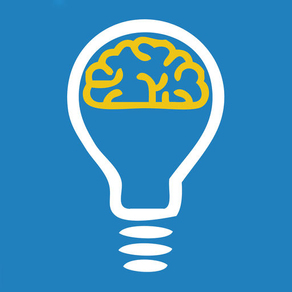
Dedalus - brain training
Free
1.5for iPhone, iPad
Age Rating
Dedalus - brain training Screenshots
About Dedalus - brain training
Dedalus is a brain training iOS app designed to enhance the performance of your mind.
Our games will train your brain for several function improvements. You can benefit upgrades in these reasoning areas:
* Attention
* Memory
* Problem solving
* Smartness/Speed
Start now to challenge yourself with our unique games and compare with others. Track your improvements and visualize them with historical data over time.
--------------------------
GAMES
* Follow the jellyfish
* Zen colors
* Lotus pond
* Memory pulse
* Natural calcolus
* Reverse solving
* Bet on color
* Bursting bubbles
* Tap the numbers!
More coming soon.
--------------------------
CONTACT US
WEBSITE: http://www.dedalus.io
FACEBOOK: https://www.facebook.com/dedalusmindtraining
TWITTER: http://twitter.com/dedalusapp
--------------------------
SCIENCE BEHIND DEDALUS
Neuroplasticity (Wikipedia)
Neuroplasticity, also known as brain plasticity, is an umbrella term that encompasses both synaptic plasticity and non-synaptic plasticity—it refers to changes in neural pathways and synapses which are due to changes in behavior, environment and neural processes, as well as changes resulting from bodily injury. Neuroplasticity has replaced the formerly-held position that the brain is a physiologically static organ, and explores how - and in which ways - the brain changes throughout life.
Neuroplasticity occurs on a variety of levels, ranging from cellular changes due to learning, to large-scale changes involved in cortical remapping in response to injury. The role of neuroplasticity is widely recognized in healthy development, learning, memory, and recovery from brain damage. During most of the 20th century, the consensus among neuroscientists was that brain structure is relatively immutable after a critical period during early childhood. This belief has been challenged by findings revealing that many aspects of the brain remain plastic even into adulthood.
Hubel and Wiesel had demonstrated that ocular dominance columns in the lowest neocortical visual area, V1, were largely immutable after the critical period in development. Critical periods also were studied with respect to language; the resulting data suggested that sensory pathways were fixed after the critical period. However, studies determined that environmental changes could alter behavior and cognition by modifying connections between existing neurons and via neurogenesis in the hippocampus and other parts of the brain, including the cerebellum.
Decades of research have now shown that substantial changes occur in the lowest neocortical processing areas, and that these changes can profoundly alter the pattern of neuronal activation in response to experience. Neuroscientific research indicates that experience can actually change both the brain's physical structure (anatomy) and functional organization (physiology). Neuroscientists are currently engaged in a reconciliation of critical period studies demonstrating the immutability of the brain after development with the more recent research showing how the brain can, and does, change.
Our games will train your brain for several function improvements. You can benefit upgrades in these reasoning areas:
* Attention
* Memory
* Problem solving
* Smartness/Speed
Start now to challenge yourself with our unique games and compare with others. Track your improvements and visualize them with historical data over time.
--------------------------
GAMES
* Follow the jellyfish
* Zen colors
* Lotus pond
* Memory pulse
* Natural calcolus
* Reverse solving
* Bet on color
* Bursting bubbles
* Tap the numbers!
More coming soon.
--------------------------
CONTACT US
WEBSITE: http://www.dedalus.io
FACEBOOK: https://www.facebook.com/dedalusmindtraining
TWITTER: http://twitter.com/dedalusapp
--------------------------
SCIENCE BEHIND DEDALUS
Neuroplasticity (Wikipedia)
Neuroplasticity, also known as brain plasticity, is an umbrella term that encompasses both synaptic plasticity and non-synaptic plasticity—it refers to changes in neural pathways and synapses which are due to changes in behavior, environment and neural processes, as well as changes resulting from bodily injury. Neuroplasticity has replaced the formerly-held position that the brain is a physiologically static organ, and explores how - and in which ways - the brain changes throughout life.
Neuroplasticity occurs on a variety of levels, ranging from cellular changes due to learning, to large-scale changes involved in cortical remapping in response to injury. The role of neuroplasticity is widely recognized in healthy development, learning, memory, and recovery from brain damage. During most of the 20th century, the consensus among neuroscientists was that brain structure is relatively immutable after a critical period during early childhood. This belief has been challenged by findings revealing that many aspects of the brain remain plastic even into adulthood.
Hubel and Wiesel had demonstrated that ocular dominance columns in the lowest neocortical visual area, V1, were largely immutable after the critical period in development. Critical periods also were studied with respect to language; the resulting data suggested that sensory pathways were fixed after the critical period. However, studies determined that environmental changes could alter behavior and cognition by modifying connections between existing neurons and via neurogenesis in the hippocampus and other parts of the brain, including the cerebellum.
Decades of research have now shown that substantial changes occur in the lowest neocortical processing areas, and that these changes can profoundly alter the pattern of neuronal activation in response to experience. Neuroscientific research indicates that experience can actually change both the brain's physical structure (anatomy) and functional organization (physiology). Neuroscientists are currently engaged in a reconciliation of critical period studies demonstrating the immutability of the brain after development with the more recent research showing how the brain can, and does, change.
Show More
What's New in the Latest Version 1.5
Last updated on May 30, 2015
Old Versions
Improved usability
Overall bugfix
Show More
Version History
1.5
Sep 1, 2014
Improved usability
Overall bugfix
Dedalus - brain training FAQ
Click here to learn how to download Dedalus - brain training in restricted country or region.
Check the following list to see the minimum requirements of Dedalus - brain training.
iPhone
iPad
Dedalus - brain training supports English, Italian
























